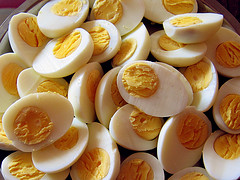DIET FACTS
Life is always a series of trade-offs, but you may have unintended nutritional consequences when you substitute one food for another. In the quest to cut calories, sugar, cholesterol or fat, you can sacrifice important nutrients. Here’s a look at the cost of common food swaps:
Egg Whites for Whole Eggs

An egg white omelette is a high-protein, low-fat breakfast much loved by fitness enthusiasts and dieters. While egg whites are healthy, egg yolks are the real goldmine of nutrients. Half of the protein in an egg is in the yolk, along with all of the vitamins A, D, E, B6 and B12, plus the minerals choline, iron and zinc. The yolk does contain all the cholesterol, but eggs are very low in saturated fat —the fat that has the most impact on blood cholesterol. A large egg has 215 milligrams of cholesterol and one whole egg a day is within the dietary guidelines for healthy adults. So, next time you want an egg for breakfast, don’t toss the yolk.
Almond Milk for Dairy or Soy Milk
Plant-based milks are all the rage, but did you know that almond milk has only 1 gram of protein per cup, compared with 8 grams for cow or soy milk? Getting sufficient protein at breakfast is a challenge for many of us, so if you are a cereal-and-milk lover, remember that almond milk on your Wheaties won’t deliver a protein punch. Almond milk is also short on potassium at 120 milligrams, compared with 382 milligrams in cow’s milk and 287 milligrams in soy milk. Potassium is a shortfall nutrient in the diets of many Americans, so a good breakfast strategy is a whole-grain, high-fiber cereal with dairy or soy milk. You can toss in a few whole almonds to boost the nutrients without short-changing your protein or potassium intake.
Popcorn for Nuts

Popcorn is a whole grain and that’s the good news, but nuts deliver so much more. All nuts are healthful, providing protein, vitamins, minerals, fiber and phytonutrients that popcorn can’t deliver. Studies have also found that a small portion of nuts is high on the satiety scale, meaning they help you feel full longer. Movie theater popcorn is especially high in calories and added fat. The Center for Science in the Public Interest found that a medium popcorn ranged in calories from 600 to 1,200 (9 cups to 20 cups) across three movie theatre chains. To be sure, nuts are high in calories and eating a whole bag of smoked, salted almonds or dark chocolate-coated pecans can sabotage a healthy diet, but a small handful is a good snack to curb hunger and to add variety to a salad, a grain or vegetable dish.
Post-Workout Whey Protein Shake for Real Protein-Rich Food
Whey is one of two milk proteins (the other is casein) and is an excellent source of branched-chain amino acids such as leucine, which appears to be an anabolic trigger to stimulate muscle protein synthesis. However, whey protein shakes are the not the only way to get the anabolic effects. Real food delivers high-quality protein and leucine, often at a fraction of the cost. Milk has been studied as a recovery beverage and found to be a good delivery vehicle for amino acids, with the added bonus of providing naturally occurring sugar (lactose) and a host of vitamins and minerals. Another good real food option is cottage cheese; a cup of low-fat cottage cheese has 28 grams of protein (most of it whey). Pair it with fresh fruit (pineapple, peaches or melon) and you’ve got a perfect recovery snack with more nutrients than your shake (and I’ll wager it tastes better, too).

No comments:
Post a Comment